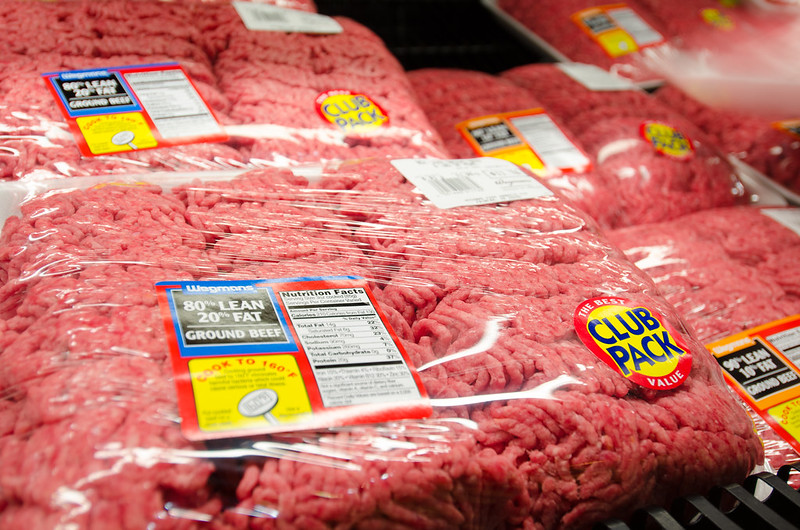An amazing thing happened last week. The Secretary of Agriculture spoke to reporters in the White House press briefing room—itself a highly unusual occurrence—and proceeded to drop a bomb on the cartel that is today’s meat industry. I’ll get to the details in a minute, but the bottom line is that the Biden administration appears poised to make the first real effort in 100 years to break the exploitive, collusive power of the meat industry’s mega-corporations, including gang-leader Tyson Foods. By my reading, this is huge. (President Biden himself might even say it’s a BFD.)
The meat industry has engaged in pandemic profiteering
Secretary Vilsack appeared in the briefing room alongside Brian Deese, President Biden’s top economic advisor and director of the National Economic Council. Deese is the author of an extraordinary new White House report that explains (in detail, with charts!) how Big Meat and Big Chicken have made record or near-record profits since late 2020, even as poultry and livestock farmers have lost money and grocery store shoppers have seen the price of meat skyrocket.
If that sounds sketchy, it’s because it is. While we’ve heard a lot of talk recently (perhaps overblown) about inflation in the late-pandemic US economy, when it comes to grocery items, prices haven’t risen evenly across the board. Instead, as Deese explained from the podium, roughly half the overall increase in Americans’ grocery bills can be attributed to just three products: beef, pork, and poultry, with double-digit increases in beef and pork prices in just the last few months. And “significant consolidation” in those three industries is the problem. The White House report comes right out and charges the big processors with gouging both farmers and consumers:
The dynamic of a hyper-consolidated pinch point in the supply chain raises real questions about pandemic profiteering. During the pandemic, wholesale prices for beef rose much faster than input prices for cattle. That means that the prices the processors pay to ranchers aren’t increasing, but the prices collected by processors from retailers are going up.
A small number of the biggest processors collectively have a lock on the US meat and poultry industry. In beef, for example, just four companies—Tyson Foods, JBS, Cargill, and National Beef—control 85 percent of the market. Recent years have seen a slew of lawsuits charging the giant meatpackers with collusion to cheat farmers, fix prices, and suppress worker wages. A joint investigation released in August by the Union of Concerned Scientists and The Guardian documents how Tyson Foods has gained a near-monopoly over the chicken industry in its home state of Arkansas, with negative consequences for farmers, workers, and communities.
Taking on the power of Big Meat
So what is the Biden administration, and particularly the USDA, going to do about it? This is where things got really interesting in the White House press room last week. One of the major complaints about the USDA from advocates for fair, healthy, and sustainable food systems is that the department caters to big agribusiness industries at the expense of small farmers and all of us who eat. That orientation reached new heights in the previous administration, as I documented, though in truth, change is long overdue. But it does appear to be coming.
Over the summer, President Biden issued an Executive Order on Promoting Competition in the American Economy, including the meat and poultry industries, and UCS applauded the action as a good first step. Last week at the White House, Secretary Vilsack outlined four actions he says the USDA will take to implement the order and combat consolidation in meat and poultry: (1) strengthening long-neglected regulations under the 100-year-old Packers and Stockyards Act meant to curb antitrust activity in the industry, (2) producing more research to document the fairness—or not—of prices paid to farmers, (3) improving labeling of meat sold in grocery stores, and (4) making substantial investments (including $500 million announced in July) to ensure that smaller meat and poultry processing plants can compete and offer an alternative to farmers and consumers.
But this is surely just the beginning of a massive fight with a very powerful industry cabal. Tyson and its co-conspirators are sure to wage an all-out lobbying campaign to evade new regulations and prevent real change in the industry. They’ve done it before, with less at stake. We can’t let them win.
What You Can Do: Write to Secretary Vilsack today! Urge him to hold his ground and take swift and decisive action to break the abusive power of Tyson Foods and the rest of the meat and poultry cartel, to protect workers, farmers, and communities.

